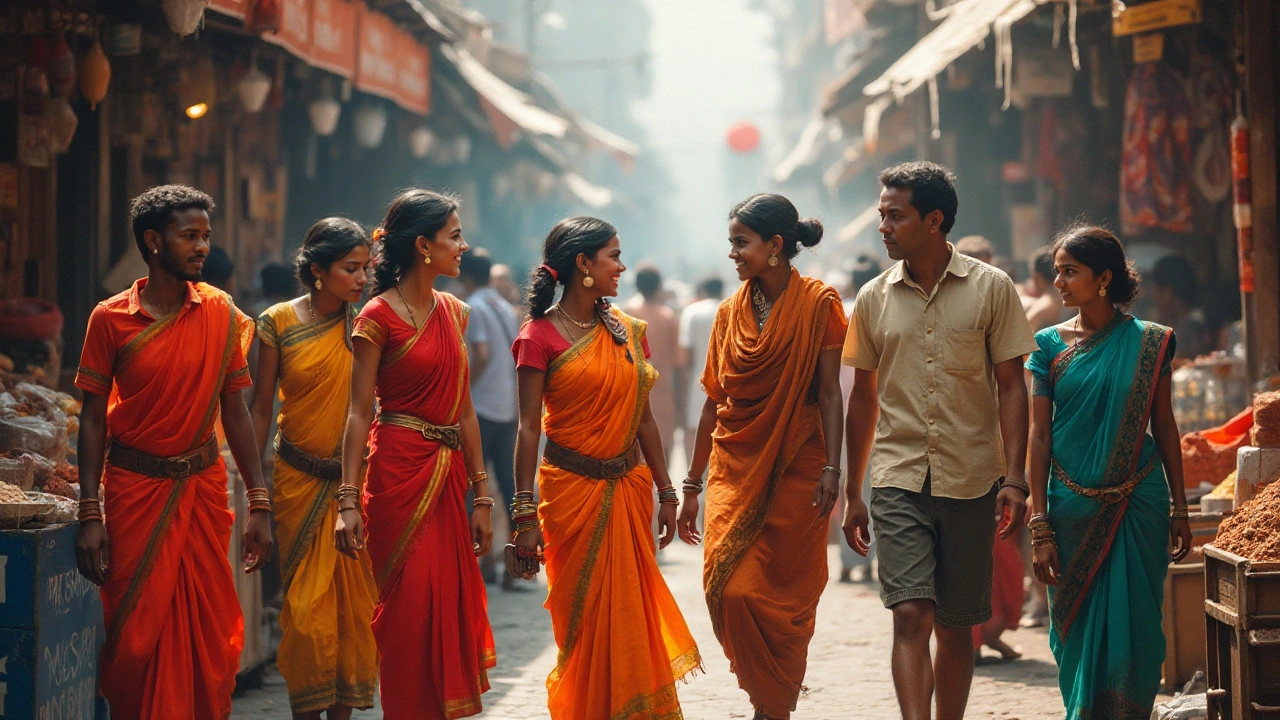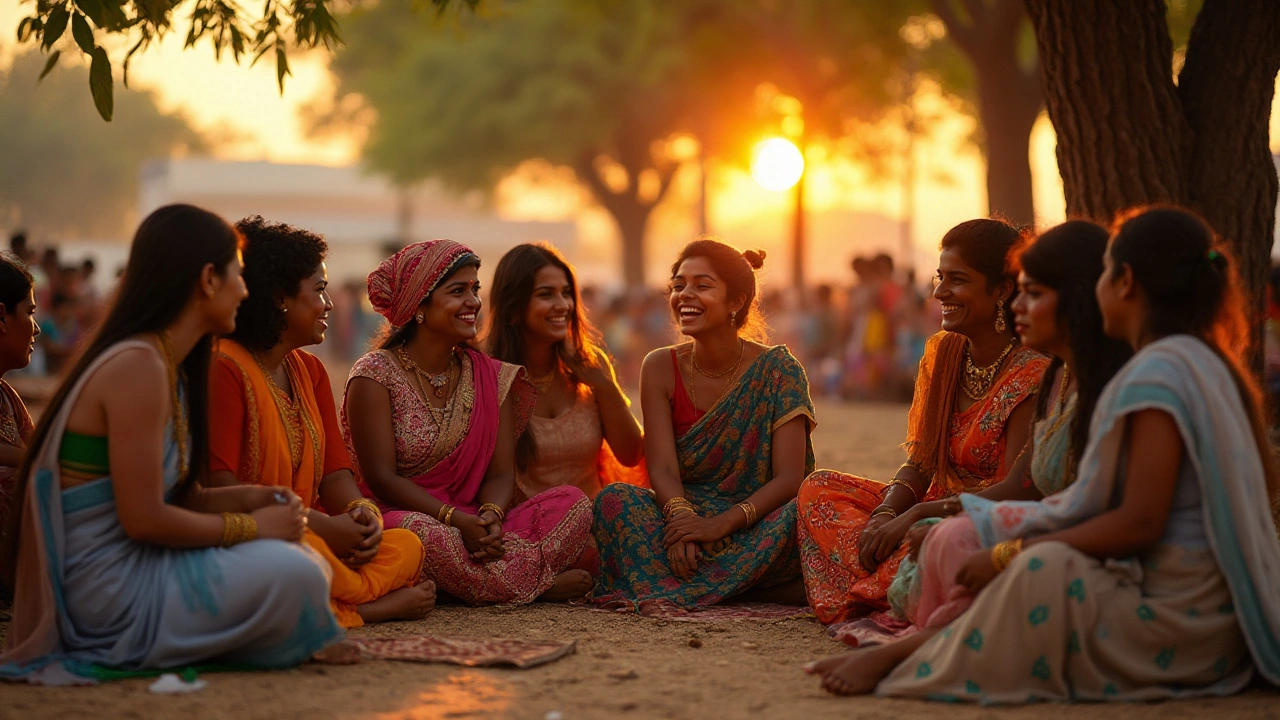Friendship in India is more than just a connection; it is a cherished bond celebrated with enthusiasm and deep affection. Across its vast and diverse landscape, India is home to numerous languages and cultures, each contributing its unique flavor to the concept of friendship.
In this article, we will embark on a journey through various Indian dialects, uncovering distinctive words used for friends. These terms are not mere linguistic curiosities; they are imbued with cultural significance and reflect how friendship is perceived within different communities.
We will also explore the influence of Bollywood, which has played a substantial role in popularizing several friendship terms, transcending regional boundaries. Understanding these words and their cultural connotations offers a glimpse into the soul of India's rich tradition of friendship.
- The Cultural Importance of Friendship in India
- Unique Words for Friends in Different Indian Languages
- The Influence of Bollywood on Friendship Terminology
- Expressions of Friendship in Indian Proverbs
- How to Choose the Perfect Term for Your Friend
The Cultural Importance of Friendship in India
In India, friendship is more than a relational bond; it is a profound and integral part of society’s social fabric. The country’s age-old traditions and rich history actually celebrate this connection, emphasizing the depth and loyalty expected from a true friendship. In a land where familial ties are valued highly, friendships often reach the same level of importance, sometimes even surpassing family loyalties in certain contexts. The ancient scriptures and epics, such as the Mahabharata and Ramayana, are a testament to the significant roles friendships have played in shaping destinies and stories across centuries.
Throughout India’s vast landscape, friendships are cultivated with care, nurtured through various life stages, from childhood to elder years. This connection begins in schools and neighborhoods, extending into colleges and workplaces, with each phase marking a deeper understanding and commitment. Celebrations such as Friendship Day, observed with enthusiasm across the nation, highlight these ties, encouraging people to cherish their friends through gestures, gifts, and shared memories. The influence of films and literature, particularly from Bollywood, portrays friendships as eternal and selfless, capturing the quintessence of companionship in dramatic and heartfelt ways.
The language of friendship in India varies widely across its diverse regions. From 'yar' in Punjabi to 'dost' in Hindi and Urdu, these terms hold different nuances, underscoring the cultural significance embedded in their usage. Each region brings its own sense of identity and warmth to these friendship terms, celebrated during festivals and gatherings. Such words are often imbued with emotional depth and are part of everyday communication, shaping the vernacular and offering insights into societal interactions. In a country so richly diverse, individual friendships often bridge cultural and linguistic divides, promoting unity and understanding.
Jawaharlal Nehru once reflected on the diversity of India saying, "India is a geographical and economic entity, a cultural unity amidst diversity, a bundle of contradictions held together by strong but invisible threads." These threads are, in many instances, the friendships that bind people from varied backgrounds, creating harmony in diversity.
Friendship also finds its place in Indian proverbs and sayings, reflecting wisdom passed down through generations. These nuggets of age-old wisdom provide insights into the values and virtues expected of friendships, often offering a moral compass in social interactions. The country's oral traditions are replete with stories and anecdotes that underscore the loyalty, sacrifice, and joy that true friendship brings. Whether portrayed in folk tales or present-day narratives, friendships in India are respected and revered, holding an exceptional place in people's hearts.
Unique Words for Friends in Different Indian Languages
India is a tapestry of languages, each offering a unique perspective on friendship, an essential aspect of social life across the country. From the northern mountains to the southern shores, every region has its own linguistic expressions that capture the spirit of companionship. One such word from the Hindi language is 'Yaar', a widely recognized term that transcends casual friendship to signify a cherished bond. It is a term often heard in everyday conversation, music, and cinema, reflecting a deep sense of camaraderie and trust among friends.
Heading south, in Tamil Nadu, the word 'Nanban' is used to refer to a friend. This term bears a certain solemnity, often implying a bond that is meant to weather the tests of time. The Tamil language, rich in literature and cultural history, gives this word an almost poetic weight, signifying not just a friend but someone who is an integral part of one's personal narrative. Tamil films and literature frequently use 'Nanban' to portray timeless friendships, which remain unbroken against all odds.
In the eastern state of West Bengal, the Bengali word 'Bondhu' is used. This term carries with it a warmth and intimacy, typical of the Bengali culture, known for its literary and cultural vibrancy. 'Bondhu' signifies more than just a companion; it represents someone who shares life’s joys and sorrows. In regional literature and songs, 'Bondhu' is often used to evoke emotions tied to long-lasting and meaningful relationships, underscoring how friendship is as essential as familial ties in one's life.
Moving westward to the state of Gujarat, the word 'Mitro' finds common usage. Gujarati culture, known for its vibrant festivals and inclusive community practices, places a heavy emphasis on social bonds. 'Mitro' is not just a friend in the traditional sense but someone who is considered an extension of one's family. It is common to hear this term exchanged during everyday interactions, solidifying its place as a marker of trust and mutual respect among people.
Among the Punjabi-speaking populations, both in India and across the world, the term 'Pind da Yaar' is popular. This phrase, though used colloquially, holds deep significance, often implying a friend who is as close as family, someone with whom you share a sense of belonging and mutual history. Punjab, known for its robust community life and buoyant celebrations, naturally integrates this theme of camaraderie into its vernacular, showcasing how friendship is interwoven into the very fabric of its cultural identity.

The Influence of Bollywood on Friendship Terminology
Bollywood, often considered the heart and soul of Indian cinema, is famously recognized for its colorful portrayal of relationships, especially friendship. This influential film industry has introduced numerous phrases and iconic terms that have become ingrained in everyday vernacular when discussing friendships in India. The magic of Bollywood lies in its storytelling ability, connecting deeply with audiences, and giving a larger-than-life treatment to friendships, which has beautifully enriched the cultural tapestry of the nation.
One of the most significant Bollywood films highlighting friendship is the classic "Sholay." This 1975 masterpiece showcased the iconic duo, Jai and Veeru, epitomizing loyalty and comradeship. Their bond was immortalized through the iconic song "Yeh Dosti," which captured the quintessence of a true friendship. Ever since, the term 'dosti' became synonymous with unwavering loyalty and trust, embedding itself into Indian consciousness. Bollywood's portrayal of such friendships often glamorized these bonds, encouraging audiences to celebrate their own friendships with similar dedication and zeal.
In more recent times, films like "Dil Chahta Hai" and "Zindagi Na Milegi Dobara" have further expanded the cultural dialogue on friendships. These films present a more modern take on friendships, focusing on emotional depth, personal growth, and life's adventures shared among friends. They capture the beauty and complexity of relationships, showing how friends are integral parts of our life's journey. The unique word for friend has often been expressed with a flair shaped by these narratives, and terms like 'yaaron' have come to signify the inseparable adventures and conversations shared among close friends.
"Friendship is not something you learn in school. But if you haven't learned the meaning of friendship, you really haven't learned anything." - Muhammad AliBollywood not only shapes language but also provides life lessons on the depth and nature of friendships. The film industry vividly showcases how friends are not only companions but also guiding figures and sources of strength. In these narratives, friends are portrayed as essential pillars of support, often going to great lengths to help one another, reinforcing the idea that a good friend is a treasure in life's journey. Such portrayals have inspired millions, strengthening the belief that friendships are vital components of human connectivity.
Moreover, Bollywood has a knack for popularizing slang and informal terms that creatively describe friendship dynamics in relatable ways. These terms often transition from silver screen to real-life lingo, influencing how people interact with their circle of friends. For instance, words like 'yaar,' 'bro,' and 'partner in crime' have all found their way into everyday language, shaping social interactions and often finding a place in dialogues and texts.
The unique word for friend as portrayed by Bollywood often extends beyond language, embodying emotions and shared experiences. Through stories filled with drama, laughter, and heartfelt moments, the industry has crafted a beautiful narrative of friendship that resonates across generations. Each film offers a fresh perspective, encouraging audiences to reflect on their friendships, appreciate those around them, and perhaps rekindle old bonds with renewed understanding. As a cultural beacon, Bollywood continues to play a pivotal role in redefining camaraderie among friends, inspiring expressions of solidarity and warmth in a world that often finds solace in such timeless connections.
Expressions of Friendship in Indian Proverbs
Indian culture, with its rich oral traditions and affinity for storytelling, has given rise to an abundance of proverbs that capture the essence of friendships. These sayings, passed down through generations, are not just linguistic treasures but also reflections of life lessons learned through experience. They offer a lens into the wisdom of Indian society, where relationships hold significant value. One such proverb, "Dosti wo hai jo har dukh-sukh mein saath khada rahe" translates to "A true friend stands by you in joy and sorrow alike," emphasizing the role of steadfast support a friend provides across different life circumstances. This emphasis on unwavering loyalty is a staple in many Indian friendship proverbs.
In Tamil, a popular saying goes, "Nanban nanbaru, natpu natpirku," meaning friendship is the true wealth, which underscores how important social bonds are considered. Such expressions remind individuals of the immaterial riches offered by meaningful connections. From the hills of Himachal Pradesh to the coastal stretches of Kerala, the sentiment remains the same: friends enrich our lives in ways that material possessions simply cannot. The use of proverbs to convey these messages allows their inherent wisdom to be accessible across various demographics and literacy levels.
The Role of Friendship Proverbs in Daily Life
The everyday usage of friendship proverbs is a testament to their continued relevance. In conversations, wise elders often invoke these sayings to advise younger generations on choosing friends wisely. They serve not only as advice but also as a gentle reminder of the high regard in which friendships are held. In fact, in many Indian households, these proverbs are used as maxims to guide behavior, ensuring that individuals remain grounded in their relationships despite external influences.
Eknath Easwaran, a respected writer on Eastern philosophy, once noted, "Proverbs are the palm trees in the desert of conversation." This citation captures the idea that proverbs can distill complex ideas into simple wisdom, making them powerful tools of communication.
It's not uncommon for these proverbs to be referenced even during larger societal events, such as festivals and weddings, where friendships are often renewed and celebrated. For example, during festivals like Raksha Bandhan, which traditionally celebrates the bond between brothers and sisters, friends exchange meaningful gifts and invoke these sayings to reaffirm their relationship, expanding the celebration of friendship beyond familial ties.
This cultural tapestry, rich with expressions of friendship, demonstrates that in India, the bond between friends is not only cherished but seen as an integral part of social and emotional wellbeing. As these proverbs continue to be spoken and shared, they ensure that the values of loyalty, trust, and mutual support remain deeply rooted in the societal consciousness. This seamless integration of linguistic art and emotional truth truly enhances the significance of having a unique word for friend in the Indian context.

How to Choose the Perfect Term for Your Friend
When it comes to selecting a unique word for a friend, especially in a diverse and culturally rich country like India, the task can seem daunting yet delightful. The multiplicity of languages across states provides plentiful options, each word carrying its own resonance and sentiment. It is important to recognize that these terms are not only linguistic tags but are imbued with cultural associations that speak to the nature of friendship within that particular region. Choosing the right term requires an understanding of your friend's personality and the nuances of your relationship.
To begin, consider your friend's cultural background or personal preferences. If your friend hails from a specific part of India or has an affinity for a particular culture, selecting a word from that language can enhance the personal connection. For instance, the Hindi word 'Yaar' or 'Dost' is common in many Bollywood movies and is also widely recognized even among non-Hindi speakers. But deeper connections might be found in less common terms like 'Saathi' in Hindi, which implies a partner through thick and thin, adding depth to the friendship.
Language also plays a pivotal role in how emotions are conveyed. For instance, 'Thozhi' in Tamil is a warm term for a female friend, reflecting camaraderie and closeness. On the other hand, 'Mitr' in Sanskrit-inspired languages like Gujarati, suggests a timeless bond, resonating with the idea of ancient friendships that transcend time. Considering these connotations can lead to a more heartfelt term for your companionship. Beyond personal backgrounds, the context of how and where the term will be used is equally essential. Will it be a nickname, something casual for everyday use, or something more formal? Terms like ‘Bhai’ used in Northern India can be an endearing choice for a friend who feels like family.
You may draw inspiration from popular media that has shed light on friendship's formative aspects. Consider this notable quote from best-selling Indian author Chetan Bhagat who once said, "The most valuable gift you can receive is an honest friend." How does this belief intersect with the word you choose? A term reflecting sincerity and trust, like 'Jigari' from Punjabi, which means best friends forever, might then feel apt. Meanwhile, understanding the broader societal influence can also guide your choice. Given the influence of Bollywood on Indian culture, the word 'Yaara' is often celebrated in films and songs, signifying deep-rooted friendships.
In terms of practicality, consider how often you will use this term and in what settings. If you both share a professional space, perhaps opt for a word that strikes a balance, like 'Mitra' which remains both respectful yet informal. Alternatively, if your friendship thrives on mischief and spontaneity, terms like 'Langotiya Yaar', meaning childhood friend in Hindi, might provide the perfect playful twist. A creative way to ensure your chosen term strikes the right note is to compile a list of potential words and share them with mutual friends for feedback. Understanding how others interpret a term can provide insight into its appropriateness and emotional weight.
